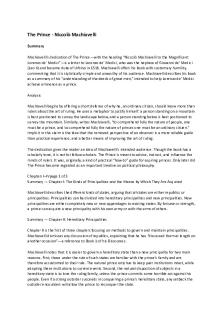THE Prince – Niccolo Machiavelli PDF

| Title | THE Prince – Niccolo Machiavelli |
|---|---|
| Author | Hanis Zakaria |
| Course | History (19th Century) |
| Institution | Institut d'Études Politiques de Paris |
| Pages | 1 |
| File Size | 30.5 KB |
| File Type | |
| Total Downloads | 27 |
| Total Views | 172 |
Summary
Fiche de lecture
...
Description
THE PRINCE – NICCOLO MACHIAVELLI Niccolo Machiavelli was born on May 3, 1469, in Florence, Italy. He wrote The Prince in 1513 and it is his most renowned work. The Prince consists of 26 chapters and the main argument is on the possibility of a new prince. During this era, Italy was in an intense political conflict. The city-states of Florence, Milan, Venice and Naples fought for control of Italy including France, Spain and the Holy Roman Empire. The Prince was written based on the politics and ruler of Florence. In chapter 5, Machiavelli came out with three ways to occupy and govern cities and principalities that had been living under their own laws. The first is to destroy them. Next is for the conqueror to inhabit the city. Third, is to allow the state to maintain its own laws but implement taxes and establish a governing group which consist of the citizens in order to create a friendly connection. The newly governing group will work hard to secure the authority of the conquering prince as they owe their existence and value the Prince’s supports. Machiavelli also mentioned that complete destruction is the best way to secure a state that has been free in the past. It is also said that a Prince that does not follow this route is putting danger on himself as there is always possibilities of the rising of rebellions. However, it is easier to conquer states that had been ruled by Prince previously. This is because citizens in this states are not used to live in freedom and need a ruler to govern them. As for republic states, it would be harder due to the strong spirit of liberty. In chapter 6, Machiavelli discussed on new principalities acquired by one’s own arms and ability. He believes that one of the best way to acquire states is by one’s own strength rather than the good fortune of noble birth, inheritence or lucky circumstances. However, he can’t deny that it is very difficult to do so but once one succeed it is easy to control. He gave the examples of Moses, Cyrus, Romulus and Theseus. He claimed that rulers who acquire state by its own is more successful in holding power as they are able to establish a new order. In chapter 25, Machiavelli talked on the influence of fortune in human affairs and the manner in which it is to be resisted. It is said that fortune only controls part of human and free determine the other half. He resembled fortune with flooding river and warned that fortune may be dangerous if men does not built dykes beforehand. As fortune varies, one may succeed or fail, even if they are on the same path. He concluded that men should adjust to time and circumstances in order to succeed rather than depend on fortune wholly....
Similar Free PDFs

THE Prince – Niccolo Machiavelli
- 1 Pages

10) Niccolo\' Machiavelli
- 3 Pages

The Morals of the Prince
- 6 Pages

Machiavelli
- 1 Pages

Essay - The Little Prince
- 2 Pages

The Prince - Summary The Discourses
- 10 Pages

Study Guide on The Prince
- 3 Pages
Popular Institutions
- Tinajero National High School - Annex
- Politeknik Caltex Riau
- Yokohama City University
- SGT University
- University of Al-Qadisiyah
- Divine Word College of Vigan
- Techniek College Rotterdam
- Universidade de Santiago
- Universiti Teknologi MARA Cawangan Johor Kampus Pasir Gudang
- Poltekkes Kemenkes Yogyakarta
- Baguio City National High School
- Colegio san marcos
- preparatoria uno
- Centro de Bachillerato Tecnológico Industrial y de Servicios No. 107
- Dalian Maritime University
- Quang Trung Secondary School
- Colegio Tecnológico en Informática
- Corporación Regional de Educación Superior
- Grupo CEDVA
- Dar Al Uloom University
- Centro de Estudios Preuniversitarios de la Universidad Nacional de Ingeniería
- 上智大学
- Aakash International School, Nuna Majara
- San Felipe Neri Catholic School
- Kang Chiao International School - New Taipei City
- Misamis Occidental National High School
- Institución Educativa Escuela Normal Juan Ladrilleros
- Kolehiyo ng Pantukan
- Batanes State College
- Instituto Continental
- Sekolah Menengah Kejuruan Kesehatan Kaltara (Tarakan)
- Colegio de La Inmaculada Concepcion - Cebu








